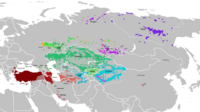| Siberian Turkic | |
|---|---|
| Northeastern Turkic | |
| Geographic distribution | Siberia |
| Linguistic classification | Turkic
|
| Early form | Old Turkic |
| Subdivisions |
|
| Language codes | |
| Glottolog | nort2688 (North)sout2693 (South) west2402 (West Yugur) |
 Yakut Dolgan Khakas Chulym Shor Altai Tuvan Tofa W. Yugur Yakut Dolgan Khakas Chulym Shor Altai Tuvan Tofa W. Yugur | |
The Siberian Turkic or Northeastern Common Turkic languages, are a sub-branch of the Turkic language family. The following table is based upon the classification scheme presented by Lars Johanson (1998). All languages of the branch combined have approximately 670,000 native and second language speakers, with most widely spoken members being Yakut (c. 450,000 speakers), Tuvan (c. 130,000 speakers), Northern Altai (c. 57,000 speakers) and Khakas (c. 29,000 speakers). Despite their usual English name, two major Turkic languages spoken in Siberia, Siberian Tatar and Southern Altai, are not classified as Siberian Turkic, but are rather part of the Kipchak subgroup. Many of these languages have a Yeniseian substratum.
Classification
| Proto-Turkic | Common Turkic | Northeastern Common Turkic (Siberian) | North Siberian | ||
| South Siberian | Sayan Turkic |
| |||
| Yenisei Turkic |
| ||||
| Chulym Turkic |
| ||||
| Old Turkic | |||||
Alexander Vovin (2017) notes that Tofa and other Siberian Turkic languages, especially Sayan Turkic, have Yeniseian loanwords.
References
- Lars Johanson (1998) "The History of Turkic". In Lars Johanson & Éva Ágnes Csató (eds) The Turkic Languages. London, New York: Routledge, 81–125. Classification of Turkic languages at Turkiclanguages.com
- Vajda, Edward J. (2001). Yeniseian peoples and languages: a history of Yeniseian studies with an annotated bibliography and a source guide. Richmond: Curzon. ISBN 978-0-7007-1290-8.
- Rassadin, V.I. "The Soyot Language". Endangered Languages of Indigenous Peoples of Siberia. UNESCO. Retrieved 2021-07-18.
- "Kumandin". ELP Endangered Languages Project. Retrieved 2021-07-15.
- Bitkeeva, A.N. "The Kumandin Language". Endangered Languages of Indigenous Peoples of Siberia. UNESCO. Retrieved 2021-07-16.
- "Northern Altai". ELP Endangered Languages Project. Retrieved 2021-07-16.
- Deviating. Probably of South Siberian origin (Johanson 1998)
- Coene 2009, p. 75
- Coene 2009, p. 75
- Concise Encyclopedia of Languages of the World. Contributors: Keith Brown, Sarah Ogilvie (revised ed.). Elsevier. 2010. p. 1109. ISBN 978-0080877754. Retrieved 24 April 2014.
{{cite book}}: CS1 maint: others (link) - Johanson, Lars, ed. (1998). The Mainz Meeting: Proceedings of the Seventh International Conference on Turkish Linguistics, August 3-6, 1994. Turcologica Series. Contributor: Éva Ágnes Csató. Otto Harrassowitz Verlag. p. 28. ISBN 3447038640. Retrieved 24 April 2014.
- Vovin, Alexander. 2017. "Some Tofalar Etymologies." In Essays in the history of languages and linguistics: dedicated to Marek Stachowski on the occasion of his 60th birthday. Krakow: Księgarnia Akademicka.
| Turkic languages | |||||||||||||||||||||||||||||||||||||||||||||
|---|---|---|---|---|---|---|---|---|---|---|---|---|---|---|---|---|---|---|---|---|---|---|---|---|---|---|---|---|---|---|---|---|---|---|---|---|---|---|---|---|---|---|---|---|---|
| Proto-language |  | ||||||||||||||||||||||||||||||||||||||||||||
| Common Turkic |
| ||||||||||||||||||||||||||||||||||||||||||||
| Oghur | |||||||||||||||||||||||||||||||||||||||||||||
| Disputed classification | |||||||||||||||||||||||||||||||||||||||||||||
| Potentially Turkic languages | |||||||||||||||||||||||||||||||||||||||||||||
| Creoles and pidgins | |||||||||||||||||||||||||||||||||||||||||||||
| |||||||||||||||||||||||||||||||||||||||||||||
This article about a Turkic language or related topic is a stub. You can help Misplaced Pages by expanding it. |